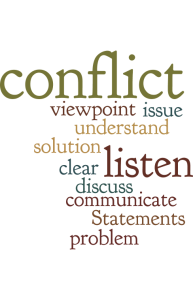Conflict happens everyday. It occurs when a sibling or spouse disagrees with us. It occurs when our kids do not do what we ask them to do. It occurs when we choose to ignore a task being asked of us. It happens with co-workers and our bosses.
Basically, it occurs because we are all different with varying personalities and perspectives on life. Conflict cannot be avoided.
There is a stigma associated with conflict.
We are told conflict is not good.
So we avoid bringing up an issue that bothers us. We act passive aggressively towards the person who has offended us, even though they might not even know there is an ongoing conflict.
Let me give you an example…
A couple of weeks ago, we had new neighbors move in. They are a young couple in their mid-twenties and have no responsibility on the weekend (from what I can tell). They officially moved in on a Saturday. That night, they had friends over. And had a really good time. I’m all about having a good time, especially on the weekend. However, we have two little ones who do not know the definition of sleeping in and our bedroom is right next to their backyard. They were in and out of the house until 4 am. And were loud.
Do you remember I have kids that wake up at 630 and have no concept of the weekend?
I wanted to call the cops on them (because I am a bad neighbor), but remembered my own principles regarding communication and decided I would address it in the morning. And by me, I mean my husband. (What? I would have gone but left the house at 730 that Sunday morning and thought it wouldn’t be very neighborly of me to knock on their door…after all, they had only been asleep for a few hours).
My husband approached our neighbors with kindness yet was firm. A mutual respect was gained that day and our neighbors now understood it was a problem for them to be in their backyard and loud until the wee hours of the morning.
If we had not taken the time to talk with them, we (I) would have been very upset when it happened the following weekend.
Here at are some healthy ways to communicate while in conflict:
- Put emotions to the side
When we are fueled by emotions, we have a hard time communicating the problem. Take time to cool off before engaging in conflict resolution.
- Think about the issue at hand
Is the issue really the problem in front of you? Make sure you have a grasp on what it is you want to communicate.
- Clearly communicate the problem
Make sure you can state the issue; what is causing the conflict? If you can’t state the problem, then the other person will most likely not understand the problem. Using “I” statements help to own the problem and communicate the problem from your point of view. It also helps the other person to not feel attacked.
- Listen to the other person
When we are in conflict, we often are not listening to what the other person is saying. We are trying to formulate the response we are going to give and miss out on key information. How often are you actually listening to what the other person is saying? Try to stop your brain from formulating a response and be an active listener.
5. Offer a solution
This step is only beneficial if the other person recognizes there is a problem to be solved. Which is why number 3 above is important. Offering a couple of different solutions creates buy in from both parties to move forward with the agreed upon solution.
My stubbornness does not always want to choose the high road, and often I don’t. But when I do, I discover I have done the five things above. Allowing the difficult conversations to take place shape our relationships. How do you handle conflict?
Here’s to the Journey!


